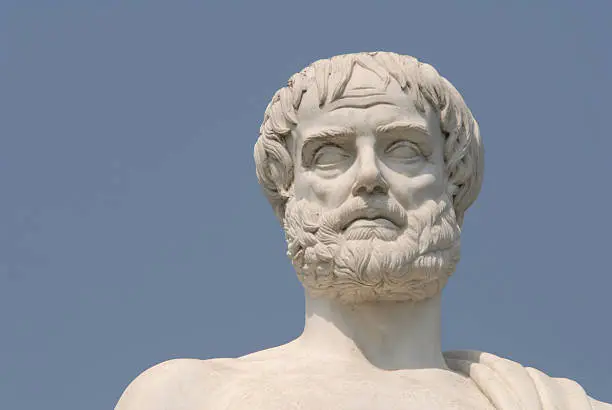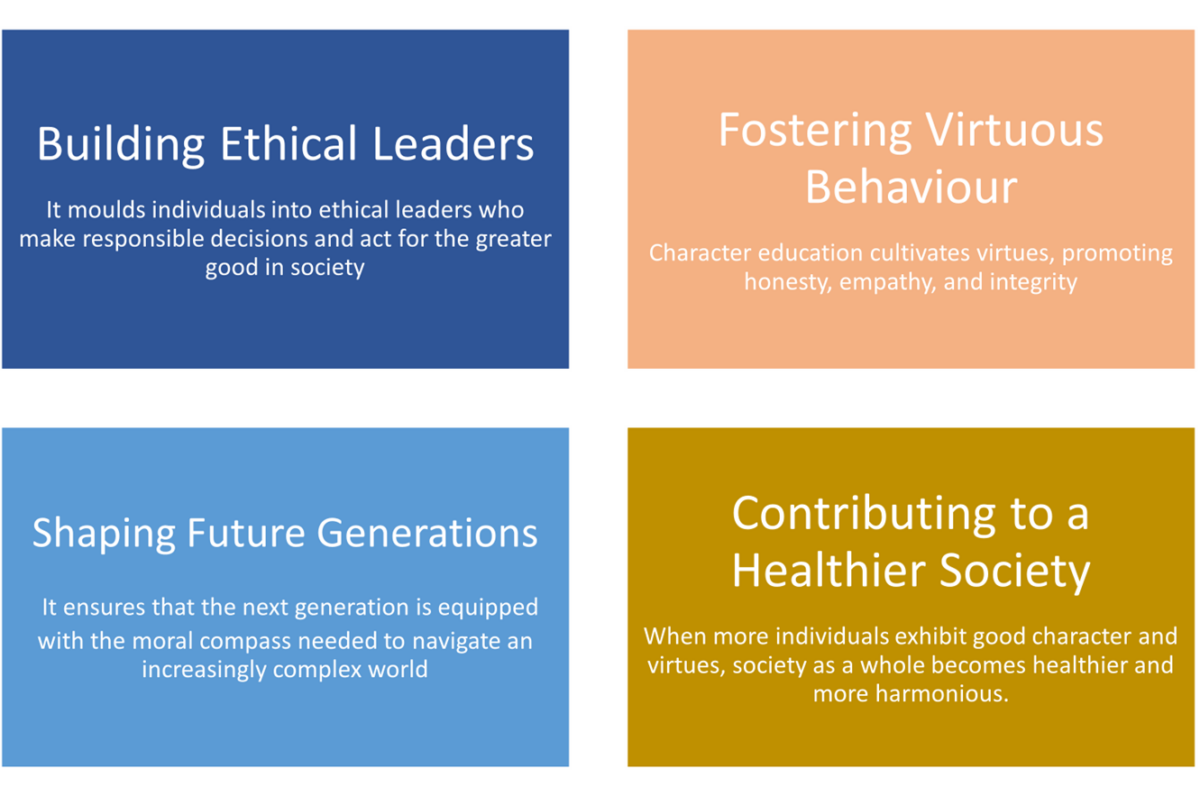Character: What Do You Do When Nobody Else Is In The Room?

Introduction
As I watched the clip of Education Secretary Gillian Keegan reeling off a sweary tirade about how she hadn’t been sufficiently praised for “doing a good job”, it got me thinking about character education and the link to role models in our society. Or rather the paucity of them.
One of the key phrases coined at schools employing a character education scheme is “What do you do in the corridor when no-one is looking?”. Well, the answer is NOT what Gillian Keegan did. Keegan was clearly unaware that she was still being recorded on a “hot mic” after a live news interview about the school concrete row.

Instead, what the Minister did was show her true colours, that is, what she is really like. And as the leader in this country for schools, the faux pas was magnified because, in her position, the conduct was inappropriate for school environments. The behaviour of those in positions of responsibility or influence as role models is key, in either a negative or positive direction.
Character education is a vital aspect of personal development, guiding individuals from a young age to cultivate virtues, ethical decision-making, and responsible conduct. In this article, we explore the definition of character education, delve into its roots and growth, and provide examples of the key messages which are profoundly important for developing role models of the future.
What Is Character Education?
According to the Jubilee Centre for Character and Virtues, character education involves “explicit and implicit educational activities aimed at nurturing positive personal strengths known as virtues”. It goes beyond academic subjects, permeating the culture and functions of families, classrooms, schools, and institutions. Character education empowers students to comprehend and appreciate the importance of ethics and morality in a wide range of situations; to “do the right thing” for the right reasons and develop autonomy and reflection in virtue practice.
The Jubilee Centre go on to add: “..the ultimate aim of character education is the development of good sense, or practical wisdom; the capacity to choose intelligently between alternatives.” Individuals are encouraged to make informed choices and cultivate practical wisdom, or what the Aristotelian zealots call phronesis, enabling them to make intelligent decisions in complex situations, as to the result they would like to bring about and how best, practically, to achieve that.
What Is The Jubilee Centre For Character And Virtues?

Founded in 2012 by Professor James Arthur and based at the University of Birmingham, the Jubilee Centre for Character and Virtues is a pioneering institution in the field of character education. Comprising a dedicated team of academics from diverse fields such as philosophy, psychology, education, theology, and sociology, the Centre takes an evidence-based approach to character education, which means they seek to back up the theory by testing whether and how it applies in the real world. Thus, they have published tons of research on the subject. They collaborate globally with academics and emphasise the significance of teaching virtues that contribute to good character, which have often been overlooked in both schools and professions.
Character Education Isn’t Just A New Fad
The concept of character education has deep historical roots, with origins traced back to ancient Greece, notably Aristotle, who was known as “the father of virtue ethics”. Aristotle’s ethical system found its place in European moral thought through figures like St. Thomas Aquinas in the thirteenth century. Character education has long been seen as an integral part of education, aiming to help students not only become knowledgeable but also morally upright individuals.

While character education has seen resurgence in the UK, as schools are searching to help their leavers depart with more than just a fistful of exams, it has a history that stretches back to the nineteenth century and Victorian values. Pushing in this direction, the Jubilee Centre believes that: “each child has the right to a character development.” Unlike in the US, where character education has been linked to conservative values, in the UK, character education has often been associated with political and educational progressivism.
Why Character Education Matters?
Character education is crucial for several reasons:

How Can You Teach Children About Moral Dilemmas?
Character education includes addressing moral dilemmas, which can be challenging to teach. It involves helping students to navigate complex ethical situations and make principled decisions about how they should act;a state of good judgement. The key is for children to reflect and have the messages reinforced all around them; whether it’s in the classroom, the playground, at the shops, on the sports field or at home, the principles of virtue still apply.
Implementing Character Education In Schools: Understanding Virtue And Character
Character and virtue are multifaceted, nuanced concepts, which can be, at least initially, difficult to quantify and hard for children to understand. In the Aristotelian virtue ethical framework, character and virtue, building blocks or key ingredients, play essential roles. Virtue encompasses qualities like honesty, integrity, and empathy, which contribute to good character. These concepts remain relevant in modern schooling and society.
Character education is a high-growth phenomenon in the UK, being adopted by an increasing number of schools, although every school which embraces character education has a slightly different approach to and emphasis on promoting the concepts. One trailblazer school, Northampton Academy, has been highlighted by the Jubilee Centre for their use of the digital platform Kloodle to help to reinforce and embed their scheme throughout the school.
The table below, plucks out some of the key phrases which are used to describe character education at a number of educational institutions:
| Hanwell Fields Community School | “Character is what we do when no-one is looking.” |
| Camborne Science and international academy | “ ..it’s about who we are and what we do.” |
| Wrenn School | “A true test of someone’s character is what they do when no one is watching.” |
| Springwest Academy | Character taught: This is where we explicitly teach our students about desirable characteristics Character caught: This is where role modelling is essential for the students to learn from examples of other people’s character Character sought: This is where the students are given opportunities to develop their character themselves via extra-curricular, enrichment, trips, charity work. |
| Michigan State University | “Character education helps children and youth become: Conscious of the right thing to doCommitted to doing the right thingCompetent in doing the right thing.” |
| US Department Of Education | “Character education teaches the habits of thought and deed that help people live and work together as families, friends, neighbours, communities and nations.” |
| Grange Park School | “.. it is recognising, understanding and developing the character traits that make us unique and then using these character traits to allow us to be the best version of ourselves.” |
| University Of Birmingham School | Character should be “lived not laminated” |
| Eastbrook Primary School | “Character is largely caught through role-modelling and emotional contagion.” |
| Trinity High School and Sixth Form Centre | “..a culture where students behave well because it is the right thing to do, rather than just for the fear of a sanction.” |
| Stoke Damerel Community College | “Our character education is instilling in our students the character and virtues that are needed for life. It is important that our young people learn and practise behaviours that reflect ethical values, that they become conscious of the right thing to do.” |
A canter through the quotes enables reaching a conclusion that, although the schools have different and inconsistent approaches to implementing character education framework, the main messages which shine through is that it’s important to ‘reflect’, ‘do the right thing’ and ‘be and see role models’…..talking of which….
Role Models: Shaping Character Through Example
Character education is not merely a subject but a philosophy that shapes individuals into responsible and ethical members of society. A key objective is to develop nurturing, caring behaviour, which creates a better world. One crucial element of achieving this is by observing role models in society, who serve as examples that positively influence how individuals behave in various aspects of life. Parents, caregivers, teachers, and peers often serve as essential role models, but so too do public figures like sportspeople and politicians; negative behaviours from such people can unwittingly encourage negative actions in others while positive role models, demonstrating qualities like integrity, compassion, and responsibility, will powerfully and supportively reinforce what young people are learning about character at school. Actions speak louder than words!
Good character should be present in everything you do, not just when you think you’re on camera!
By Neil Wolstenholme, Kloodle Chairman
FE News on the go…
Welcome to FE News on the go, the podcast that delivers exclusive articles from the world of further education straight to your ears.
We are experimenting with Artificial Intelligence to make our exclusive articles even more accessible while also automating the process for our team of project managers.
In each episode, our thought leaders and sector influencers will delve into the most pressing issues facing the FE sector, offering their insights and analysis on the latest news, trends, and developments.











Responses